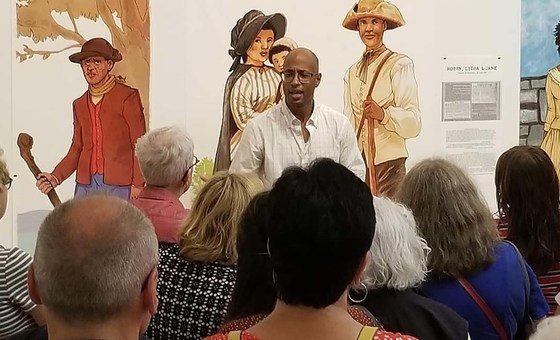“The history of slavery is a history of suffering and barbarity that shows humanity at its worst,” he said.
“But it is also a history of awe-inspiring courage that shows human beings at their best – starting with enslaved people who rose up against impossible odds and extending to the abolitionists who spoke out against this atrocious crime.”
An ‘evil enterprise’
For more than 400 years, over 13 million Africans were trafficked across the Atlantic Ocean in what the Secretary-General called the “evil enterprise of enslavement”.
Men, women and children were “ripped from their families and homelands – their communities torn apart, their bodies commodified, their humanity denied.”

Slavery memorial in Stone Town, Zanzibar, United Republic of Tanzania. Photo: Israa Hamad
A haunting legacy
“The legacy of the transatlantic slave trade haunts us to this day. We can draw a straight line from the centuries of colonial exploitation to the social and economic inequalities of today,” he said.
“And we can recognize the racist tropes popularized to rationalize the inhumanity of the slave trade in the white supremacist hate that is resurgent”, he added.
Mr. Guterres stressed that it was incumbent on everyone to fight slavery’s legacy of racism, using the “powerful weapon” of education – the theme of this year’s commemoration.
Unite against racism
Teaching the history of slavery can “help to guard against humanity’s most vicious impulses,” he said.
“By studying the assumptions and beliefs that allowed the practice to flourish for centuries, we unmask the racism of our own time,” he added. “And by honouring the victims of slavery, we restore some measure of dignity to those who were so mercilessly stripped of it.”
The Secretary-General called for people everywhere to “stand united against racism and together build a world in which everyone, everywhere can live lives of liberty, dignity, and human rights.”
UN commemorative events
The UN has organized a series of events to commemorate the International Day.
On Monday, the UN General Assembly will hold a meeting where Brazilian philosopher and journalist, Professor Djamila Ribeiro, will deliver the keynote address.
Ms. Ribeiro has been using the power of education to fight discrimination against Afro-Brazilians, including through her bestselling book titled ‘Little Anti-Racist Manual’ and her Instagram account, which has attracted more than a million followers.
American university student Taylor Cassidy, recognized as one of TikTok’s 2020 Top 10 Voices of Change, will deliver the youth address. Ms. Taylor empowers her two million followers with uplifting videos on Black history.
On Thursday, Bryan Stevenson, Founder and Executive Director of the Equal Justice Initiative – a non-profit working to end mass incarceration in the United States – will be the featured speaker and a participant in a panel discussion highlighting efforts by museums to include the voices of people of African descent and deal with the colonial past.
Other panelists will include the General Director of the Rijksmuseum in the Netherlands, Taco Dibbits, and the Head of its History Department, Valika Smeulders.
The 2023 commemoration kicked off in late February with the opening of an interactive exhibition titled Slavery: Ten True Stories of Dutch Colonial Slavery, brought to the UN by the museum, which is located in Amsterdam.

